The Singapore APEC Study centre at ISEAS – Yusof Ishak Institute organised a seminar with Mr Emmanuel A. San Andres and Ms Rhea C. Hernando as the key speakers from the APEC Policy Support Unit (PSU) to share the findings of the ‘APEC Regional Trends Analysis (ARTA): Mixed Growth amid Heightened Uncertainty’ research report.
Seminar on “APEC in 2017 and Beyond: Striving for Open Economies and Delivering on Inclusive Growth”
Seminar on “A Divided APEC: Challenges Ahead and Outlook for 2019”
Tuesday, 27 November 2018 – As part of the activities of the Singapore APEC Study Centre at ISEAS-Yusof Ishak Institute, a seminar was convened to discuss recent developments at the APEC Leaders Meeting which took place at Port Moresby, as well as the challenges ahead in 2019 when Chile takes the chair.

From left to right: Dr Alan Bollard, Dr Siwage Dharma Negara, Mr Hellmut Lagos, and Mr Eduardo Pedrosa (Credit: ISEAS – Yusof Ishak Institute)
The seminar was helmed by APEC Study Centre coordinator Dr Siwage Dharma Negara, who was flanked by a panel consisting of Dr Alan Bollard (Executive Director of the APEC Secretariat), Mr Hellmut Lagos (Host Economy Representative for APEC Chile 2019 in Singapore), and Mr Eduardo Pedrosa (Secretary General of the Pacific Economic Cooperation Council). There were around 50 attendees, including diplomats, researchers, journalists, and members of the public.

Dr Bollard during his presentation (Credit: ISEAS – Yusof Ishak Institute)
Dr Bollard outlined the two major organising themes of the Port Moresby summit: (i) helping people in the region to improve their livelihoods, especially through trade and economic integration, and (ii) applying digital technologies to benefit both businesses and people, especially small and remote enterprises and women in the informal economy. Dr Bollard shared how Papua New Guinea insisted on elevating digital futures into a priority because they saw the potential for digital technology to assist in bridging small and remote local entrepreneurs to the world market. Additionally, he attributed the lack of a Leaders’ Declaration to the differing understandings of “free and open” vis-à-vis “fair and reciprocal” trade, among others. He mentioned the institutional importance of the Free Trade Area of the Asia-Pacific (FTAAP) in ensuring that the various regional trade agreements progress in a converging direction. However, despite some disagreements, the leaders remained committed in recognising the importance of trade and APEC, especially the latter’s role as an “incubator for new ideas”. Furthermore, he shared that it was important for APEC to avoid papering over differences, but rather to understand and address these issues forthrightly.

Mr Lagos highlighting the importance of APEC to the Chilean economy (Credit: ISEAS – Yusof Ishak Institute)
After highlighting the importance of APEC to the Chilean economy, Mr Lagos delineated the three primary priorities that Chile will advance during its tenure as APEC chair in 2019: addressing the challenge of improving digital infrastructure and access to digital economy, ensuring preparedness for the 4th Industrial Revolution, and increasing opportunities for women, small businesses, and indigenous people. He further shared that Chile will also continue to engage both commerce and academia through mechanisms such as the APEC Business Advisory Council (ABAC) and the APEC Study Centre Consortium (ASCC).

Mr Pedrosa during his presentation (Credit: ISEAS – Yusof Ishak Institute)
Mr Pedrosa discussed the results of an annual survey conducted by the Pacific Economic Cooperation Council (PECC) on the state of the region which draws upon the responses of 529 regional policy experts (including government officials, academics, civil society activists, and journalists). The survey highlighted lowered expectations for growth in the region, prompted by worries over increased protectionism and the ongoing trade war between China and the United States. The respondents also registered their increasing pessimism about the political environment for freer trade in future. Additionally, Mr Pedrosa shared that many of the respondents expressed the desire for APEC to address the rising trade tensions and the future of the WTO and the emergence of anti-globalisation and anti-trade sentiments. However, he also noted that perceptions of APEC remain positive by a margin of 63% to 16%. This is in contrast to the ambivalence recorded in the first edition of the survey in 2006, where only 46% of the respondents indicated a favourable view of APEC and 37% registering the opposite sentiment.

The audience during the seminar (Credit: ISEAS – Yusof Ishak Institute)
The seminar concluded with the panellists addressing questions from the audience about the need for mutually beneficial and fair infrastructural investments, the progress of APEC initiatives and the lessons learnt following the 2018 summit.
Monday, 9 July 2018 – The 2018 Asia-Pacific Economic Cooperation (APEC) theme is “Harnessing Inclusive Opportunities, Embracing the Digital Future”. To explain the implications of this theme and summarise the key outcomes of the recently concluded APEC Trade Ministers’ meeting in Port Moresby, the Singapore APEC Study Centre at ISEAS – Yusof Ishak Institute organised a seminar with key speakers Dr Denis Hew and Mr Emmanuel A. San Andres from the APEC Policy Support Unit, and Mr Benjamin Tan from Singapore’s Ministry of Trade and Industry.
From left to right: Dr Denis Hew, Mr Emmanuel A. San Andres, Dr Siwage Dharma Negara, and Mr Benjamin Tan (Credit: ISEAS-Yusof Ishak Institute)
Following the introductory remarks by Dr Siwage Dharma Negara, Coordinator of the APEC Study Centre, Dr Hew presented a detailed analysis of some of the major economic trends in the region. Based on a recent report published by the APEC Policy Support Unit, he spoke about the overall growth witnessed in the areas of commercial services, industrial production and trade among member economies. Dr Hew also highlighted some of the concerns regarding decline in global FDI inflows and uncertain trade policy directions. Mr San Andres continued the discussion, specifically focussing on the importance of inclusive economic growth amidst growing sentiments of protectionism and anti-globalism. In his presentation, he also touched upon the objectives of the APEC Vision Group and some of the policy implementation challenges that lie ahead.
Dr Denis Hew, from the APEC Policy Support Unit, during his presentation (Credit: ISEAS-Yusof Ishak Institute)

Mr Emmanuel A. San Andres is also from the APEC Policy Support Unit (Credit: ISEAS-Yusof Ishak Institute)
Mr Benjamin Tan from Singapore’s Ministry of Trade and Industry (Credit: ISEAS-Yusof Ishak Institute)
Mr Tan then drew the audience’s attention to the main discussion points of the APEC Trade Ministers Meeting held in Port Moresby, Papua New Guinea (PNG) on 25 and 26 May 2018. He mentioned that all member economies were keen on improving connectivity, deepening regional economic integration, promoting sustainable and inclusive growth and strengthening technical cooperation. An important outcome of the meeting was that PNG Foreign Affairs and Trade Minister, Rimbink Pato (chairperson) also issued a statement supporting a multilateral trading system.

An audience of 30 people attended the seminar (Credit: ISEAS-Yusof Ishak Institute)
The seminar lasted for ninety minutes, and was attended by an audience of thirty people, including research scholars, students and members of the public. The guest speakers also answered their questions on an array of topics, including: the impact of the trade war between the US and China, structural changes occurring in the APEC member economies, labour policy and job losses, and commitments made under the Bogor Goals.
Seminar on “Toward a Bipolar Trading Order? China vs. the US”
Tuesday, 5 June 2018 – Under the Trump administration, the US has withdrawn from the Trans Pacific Partnership (TPP) and has aggressively undertaken unilateral trade measures. Meanwhile, China has promoted its One Belt, One Road Initiative as well as the Asian Infrastructure Investment Bank. Are China and the US now at loggerheads and are we on the verge of a trade war? Are there now two distinct competing visions of a new global economic order? To help answer these questions, the Singapore APEC Study Centre at ISEAS – Yusof Ishak Institute invited Professor Vinod K Aggarwal (Professor of Political Science, Affiliated Professor in the Haas School of Business) who shared some riveting insights on the subject.

From left to right: Dr Siwage Dharma Negara, Coordinator of the APEC Study Centre, and Professor Vinod K Aggarwal, Professor of Political Science, Affiliated Professor in the Haas School of Business. (Credit: ISEAS-Yusof Ishak Institute)
Following the introductory remarks by Dr Siwage Dharma Negara, Coordinator of the APEC Study Centre, Professor Aggarwal began his presentation, first, by shedding some light on the problems faced by the World Trade Organisation (WTO), bilateral free trade agreements (FTAs), multilateral regional accords, and more recently, so called mega-FTAs. Comparing America’s broad trade strategies under President Obama and President Trump, he spoke about the US withdrawal from the Trans Pacific Partnership (TPP) and the country’s systemic-, domestic-, and ideational challenges with regard to the Transatlantic Trade and Investment Partnership (TTIP) with the European Union. Directing the audience’s attention to the trade policy followed by the current government, he presented interesting views on the origins of the assault on the “Liberal Order” and the administration’s objective of revising the North American Free Trade Agreement (NAFTA) and renegotiating bilateral trade deals with major partners all around the world.
Professor Aggarwal during his presentation (Credit: ISEAS-Yusof Ishak Institute)

The audience comprised of research scholars, students, and members of the media and the public, among others. (Credit: ISEAS-Yusof Ishak Institute)
The seminar was 90 minutes long, and was attended by an audience of 55 people, including research scholars, students, members of the media and the public. The guest speaker also answered their questions on an array of topics, including: the impact of a bipolar trading world on smaller economies, the status of India-APEC relations, labour policy and job losses, and the growth of global trade vs. GDP expansion.
Tuesday, 6 December 2016 – This public seminar featured four panellists – Dr Alan Bollard (APEC), Mr Eduardo Pedrosa (PECC), Dr Malcolm Cook (ISEAS), and Ms Joanne Guo Wei Ling (SBF). Dr Francis Hutchinson, Senior Fellow and Coordinator of the Regional Economic Studies Programme at ISEAS, moderated the panel.
Dr Bollard, the Executive Director of the APEC secretariat, provided an overview of the APEC meetings in Lima, Peru. He highlighted the call from APEC leaders for “Globalization 2.0” with three main characteristics: (i) an inclusive globalization that emphasizes how to manage the distributional effects and how to communicate them better; (ii) a new globalization that shifts the focus from the manufacturing to the larger services sector; (iii) a soft globalization that pays attention to the APEC’s approach of obtaining voluntary consensus.

(Source: ISEAS – Yusof Ishak Institute)
Mr Pedrosa, the Secretary General of the Pacific Economic Cooperation Council, provided a summary of their annual survey of government, business and academic leaders in APEC (reported in The State of the Region 2016-2017). He stressed the bifurcation of views between the advanced and developing economies: those from developing economies were relatively more optimistic about regional trade agreements, whereas those from advanced economies perceived an urgent need to manage anti-trade sentiments. He also highlighted that structural reforms and barriers to data flows were key impediments to services trade, the largest driver of growth in recent times. He concluded by noting that positive views towards APEC nearly doubled in 2014, and has been sustained till present (2016).

Dr Francis Hutchinson, ISEAS Senior Fellow and Coordinator of the Regional Economic Studies Programme, moderating the seminar “APEC: A Changed Global Landscape, Rising Protectionism, and Directions Ahead” (Source: ISEAS – Yusof Ishak Institute)
Dr Cook, a Senior Fellow at the ISEAS-Yusof Ishak Institute, provided a historical overview of APEC, its membership, and its objectives. He emphasized that APEC did not only serve economic functions, but provided a platform for dialogue over many non-economic issues. He also discussed APEC’s role in the backdrop of evolving strategic relations between China and a Trump-led US. He also highlighted how discussion has centred on having a trading architecture of Asia-Pacific versus East Asian countries.
Ms Guo, Assistant Director of the Singapore Business Federation, provided the perspective of the business community. She highlighted that with the unlikely implementation of the TPP, businesses would look for opportunities in other countries. She conveyed that the business community is hopeful for bilaterals and other regionals that might lead up to a Free Trade Area of Asia-Pacific (FTAAP). She also expressed her hope that the standards proposed in the TPP will live on in one form or another. More than 60 participants attended the Seminar.

Participants at the seminar (Source: ISEAS – Yusof Ishak Institute)
Asia-Pacific Economic Cooperation: New Agenda in Its Third Decade
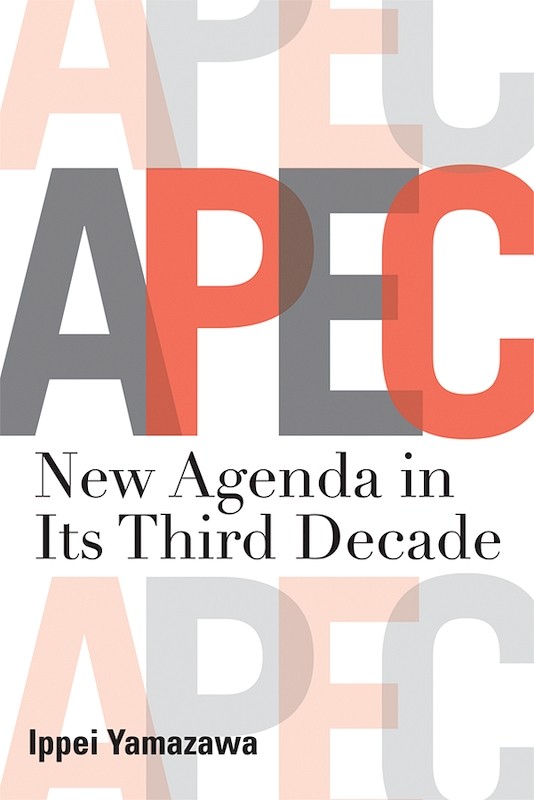
Ippei Yamazawa is one of the fathers to the study of Asia-Pacific regional cooperation in Japan and has contributed hugely to the development and work of APEC over many years. APEC is a crucial trans-regional arrangement that draws the United States into constructive economic engagement with East Asia. This book makes it clear why APEC remains such a crucial element of regional economic architecture and defines an agenda going forward to which regional leaders should aspire. Here is a first rate exposition of the priorities for regional cooperation in Asia and the Pacific.To purchase the book, click here.
APEC at 20: Recall, Reflect, Remake
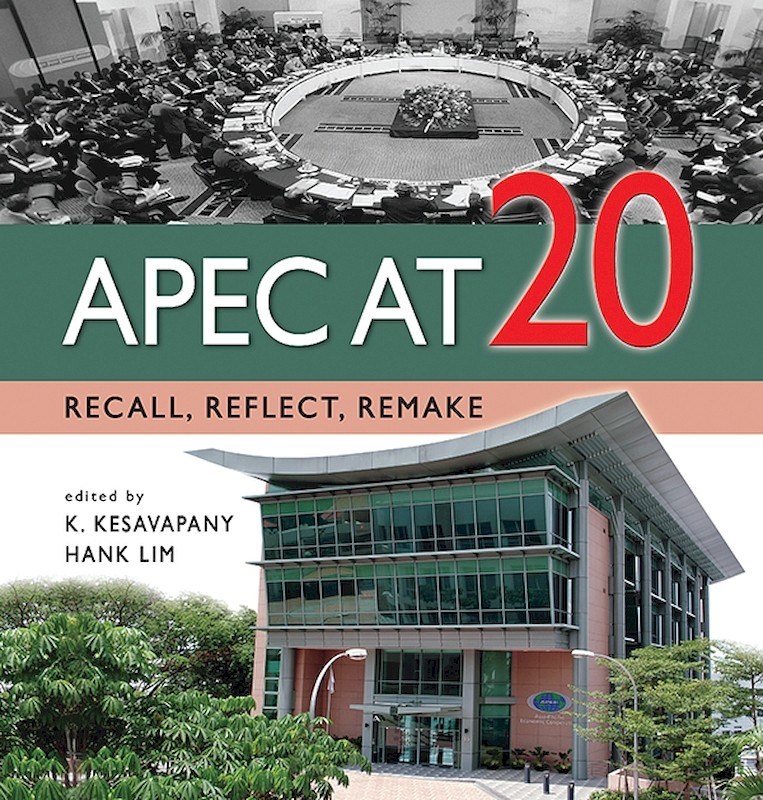
Spanning 20 years of history, the achievements of APEC may seem uneventful in the eyes of some observers. Yet careful deliberation will point to APEC’s many remarkable high points as well as some of the challenges. The foundations of APEC were set in place about 40 years ago based on the achievements of the Association of Southeast Asian Nations (ASEAN) and the Pacific Economic Cooperation Council (PECC). One of the cornerstones of APEC’s vision is to achieve a free and open trade area among its member economies. This vision is anchored in the Bogor Goals that remain the centrepiece of the APEC process. The Bogor Goals represent a cause for celebration as well as angst. Celebration because the region has moved towards achieving a much more liberalized environment of trading and investment since 1989, angst because the deadlines for achieving the goals have not yet been fully realized. Today, APEC embraces many of the world’s dynamic developed and developing economies that are better poised to meet the new challenges of this century. For those seeking to get a quick sweep of APEC, this book recalls, reflects and provides enough food for thought on the possible remake of APEC. The chapters are carefully written by experts who have been directly involved in the APEC process one way or another. The invaluable insights serve to place the whole APEC process in a balanced perspective, yet with candid deliberations. To purchase the book, click here.
An APEC Trade Agenda? The Political Economy of a Free Trade Area of the Asia-Pacific
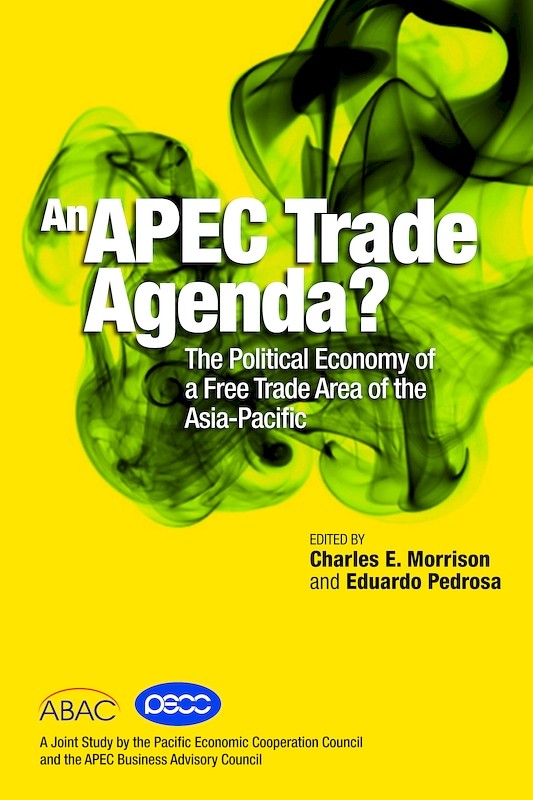
The proposal for an Asia-Pacific-wide free trade agreement is one of the oldest ideas for promoting mutually beneficial regional cooperation dating back to the mid-1960s. In more recent times, the idea has found new support for two main reasons: as a plan B to the stumbling Doha Development Agenda (DDA) round of WTO negotiations; and as a solution to the noodle bowl of bilateral agreements in the region. This report assesses the political feasibility of the Free Trade Area of the Asia-Pacific (FTAAP) proposal and looks at alternative modalities for achieving free trade and investment in the Asia-Pacific. The report includes trade policy perspectives from the three largest economies of the region: the United States, China and Japan, lessons from similar proposals such as the Free Trade Area of the Americas (FTAA), possible convergence among the many preferential trade agreements (PTAs) in the region, and alternative approaches to regional economic integration.To purchase the book, click here.
Developing Bond Markets in APEC: Towards Greater Public-Private Sector Regional Partnership
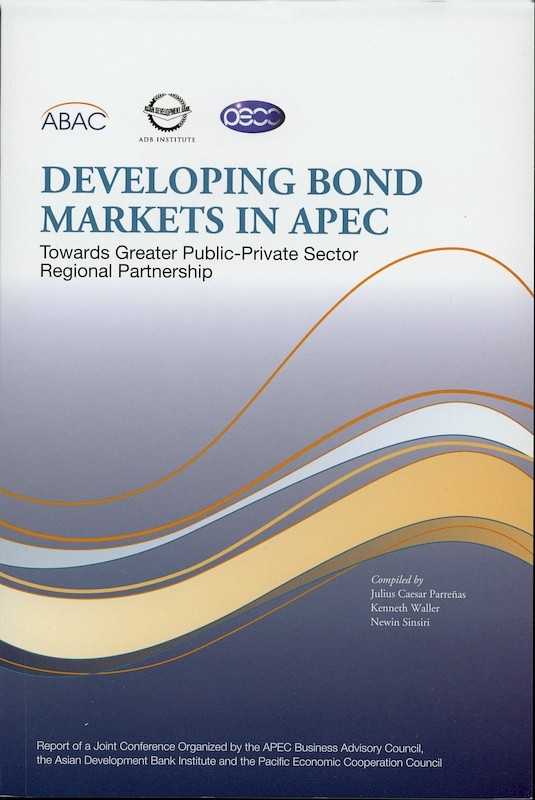
This conference report provides a unique overview of the development of local currency bond markets in the Asia-Pacific region and cross-border investment and issuance in these markets. It brings together insights of the regions leading capital market regulators, private sector market players, finance and central bank officials and experts from academe and international development organizations, who have gathered together to assess the extent to which the regions bond markets have developed, and map out a regional strategy based on publicprivate sector partnership that promises to address key policy reform and capacity-building issues. This report concludes that a few emerging markets in the region have made significant advances, but many others need to undertake fundamental reforms to achieve adequate market depth and liquidity and develop an enabling regulatory framework. Successfully undertaking these reforms requires intensive regional cooperation to help address obstacles in individual economies and facilitate greater cross-border activity in the regions bond markets. Coordination is also needed to ensure the consistency of parallel initiatives being undertaken within various regional bodies, particularly APEC, ASEAN Plus Three and EMEAP, to develop a regional bond market. To purchase the book, click here.
APEC in the 21st Century
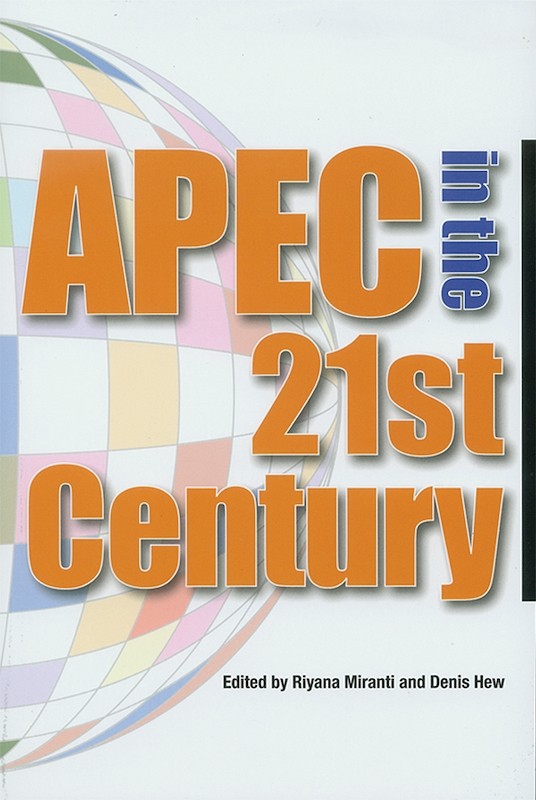
APEC is a unique organization that promotes economic cooperation in the Asia-Pacific region. It remains an informal intergovernmental organization that provides a useful platform for leaders, ministers, businessmen and experts to discuss regional issues on a regular basis. This book examines APECs accomplishments in recent years and the challenges it faces in the new century. These challenges include the proliferation of Free Trade Agreements in the region and the implications of Chinas accession in the World Trade Organization.To purchase the book, click here.
APEC as an Institution: Multilateral Governance in the Asia-Pacific
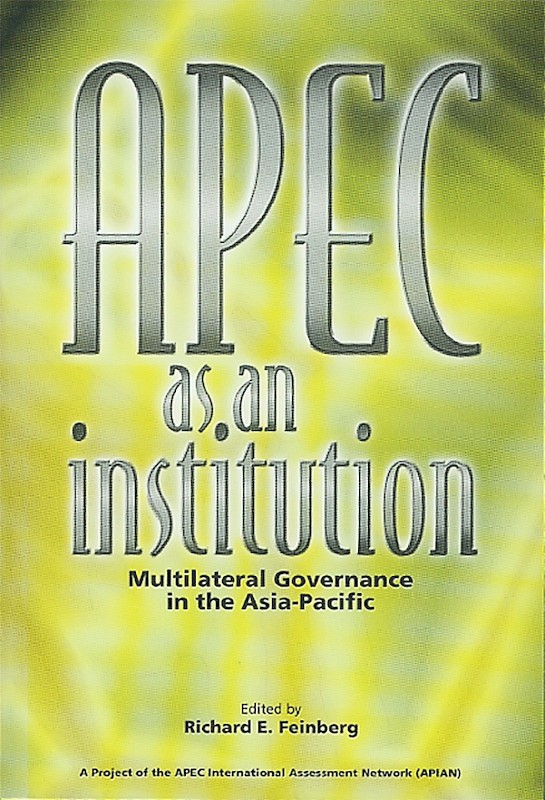
APEC is an experimental multilateralism, relying not on a large bureaucracy but rather upon national government agencies, semi-autonomous inter-governmental committees and “virtual” associations. Organized around the principles of consensus, voluntarism and unilateralism, APEC has eschewed binding agreements enforced through monitoring and robust compliance mechanisms. This volume assesses the strengths and weaknesses of APEC’s “soft” institutionalism, and its capstone policy report, “Remaking APEC”, identifies reforms that would close the credibility gap between APEC’s promises and accomplishments. Chapters by leading scholars at APEC Study Centres investigate APEC’s core agenda — trade and investment liberalization and capacity-building — delve into the inner workings of APEC’s bureaucracy, and explore APEC’s interactions with civil society, including the private sector and NGOs. This volume contains both the policy report and in-depth specialized studies. It is the product of the APEC International Assessment Network (APIAN), a collaborative, independent project among participating APEC Study Centres. APIAN’s first major study, Assessing APEC’s Progress: Trade, Ecotech and Institutions was also published by ISEAS(2001).To purchase the book, click here.




ISEAS Commentaries
ISEAS Commentaries
– 29 Nov 2016
– 24 Nov 2016